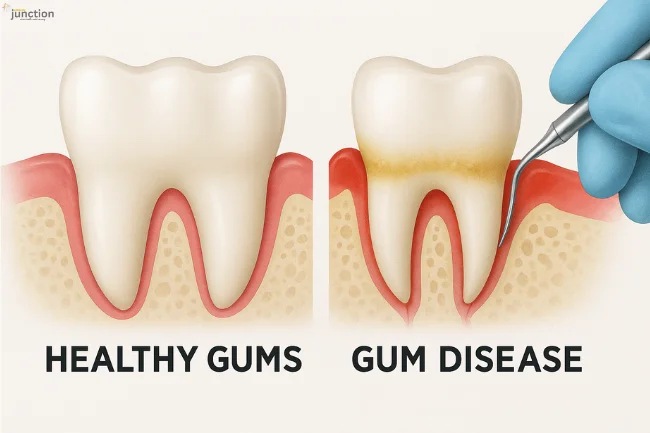Maintaining oral health is crucial not only for a confident smile but also for overall wellbeing. Poor oral hygiene can lead to a range of oral health issues, from infections to chronic gum disease. Among the most common conditions are oral thrush and periodontitis, both of which require timely attention and proper care.
Signs of Oral Thrush and the Factors Behind It
Oral thrush arises when naturally occurring Candida microbes grow out of control in the mouth. While it can affect anyone, it is particularly common among infants, older adults, and individuals with weakened immune systems. Understanding oral thrush symptoms can help in early detection and management.
Typical signs include white, creamy lesions on the tongue, inner cheeks, and sometimes on the roof of the mouth. These patches may cause discomfort, a burning sensation, and difficulty swallowing. In some cases, patients experience a loss of taste or mild soreness. As part of common Oral Health Issues, contributing factors include prolonged antibiotic use, uncontrolled diabetes, and also due to specific drugs that lower the body’s saliva output.
Maintaining excellent oral hygiene is key to preventing oral thrush. Regular brushing, flossing, and using an antiseptic mouthwash can help control the growth of harmful microbes. Additionally, addressing underlying health conditions that compromise immunity can significantly reduce the risk of developing oral thrush.
Periodontitis: Understanding and Managing Gum Disease
Gum disease is a prevalent issue affecting adults worldwide, with periodontitis being one of its most severe forms. Periodontitis occurs when plaque and tartar build up beneath the gum line, causing inflammation and infection. If untreated, it can lead to gum recession, tooth mobility, and even tooth loss.
Effective periodontitis treatment involves a combination of professional dental care and home-based oral hygiene practices. Dentists typically begin with deep cleaning procedures such as scaling and root planing to remove plaque and bacteria from beneath the gums. In advanced cases, surgical interventions may be necessary to restore gum and bone health.
Alongside professional treatment, consistent daily oral care plays a pivotal role in managing periodontitis. Using antimicrobial mouthwash can help reduce bacteria, while thorough brushing and flossing prevent further plaque buildup. A balanced diet and avoiding tobacco products also contribute to healthier gums and teeth.
Using Antimicrobial Rinses to Protect Against Oral Health Issues
Antimicrobial mouthwashes are an essential tool in preventing and managing oral health issues. They target harmful bacteria and fungi that contribute to conditions like oral thrush and gum disease. Regular use as part of a complete oral care routine can reduce the risk of infections, soothe irritated tissues, and promote overall oral hygiene.
For individuals prone to oral thrush or gum inflammation, incorporating an antiseptic mouth rinse into daily practice can complement professional treatments and support long-term oral health. Consistency is key, and pairing mouthwash with proper brushing and flossing ensures the best results.
Everyday Practices for a Cleaner, Healthier Mouth
-
Brush twice daily: Use a soft-bristled toothbrush and fluoride toothpaste to remove plaque.
-
Floss regularly: Cleaning between teeth prevents bacterial buildup.
-
Rinse with mouthwash: Antimicrobial mouthwashes help eliminate germs that brushing alone cannot reach.
-
Maintain a balanced diet: Reduce sugar intake and eat nutrient-rich foods for healthy gums.
-
Schedule regular dental check-ups: Early detection of oral health issues ensures timely intervention.
-
Stay hydrated: Saliva maintains oral balance by diluting acids and removing bacterial buildup.
Conclusion
Oral health is more than just a bright smile—it’s a critical component of overall wellness. By recognizing early signs of conditions such as oral thrush symptoms and seeking professional care for periodontitis treatment, individuals can maintain healthy gums, strong teeth, and a confident smile. Incorporating a thorough oral care routine, including brushing, flossing, and antimicrobial mouthwash, ensures effective prevention and long-term oral health.
FAQs about Oral Health Issues
1. Can stress affect oral health issues like thrush or gum problems?
Yes. High stress levels can weaken the immune system and increase inflammation in the body, making you more vulnerable to various oral health issues. Managing stress through sleep, exercise, and relaxation practices can indirectly support better oral health.
2. Are oral health issues linked to other medical conditions?
Certain oral conditions may be connected to systemic health problems. For example, untreated gum inflammation has been associated with heart concerns and blood sugar imbalance. Keeping your mouth healthy supports overall body wellness.
3. Do lifestyle habits increase the risk of developing oral health issues?
Yes. Habits like frequent snacking, drinking sugary beverages, and neglecting hydration can encourage bacterial growth. Choosing water, limiting sweet foods, and maintaining good habits can reduce your risk.
4. Can mouthwashes replace brushing and flossing for preventing oral health issues?
No. While antimicrobial rinses are helpful, they cannot fully remove food particles or plaque. Mouthwash works best when used alongside brushing and flossing, not as a substitute.
5. How often should I replace my toothbrush to avoid oral health issues?
It’s recommended to replace your toothbrush every 3 months or sooner if the bristles become worn. A fresh brush ensures better cleaning and lowers the chance of bacteria buildup.

I’m Salman Khayam, founder of Wellbeing Junction. I synthesize trusted information from research and expert guidance to create clear articles across health, wellness, and lifestyle topics.
Disclaimer: Content is for informational purposes only and is not medical advice. Consult a qualified expert regarding personal health or specialized questions.




